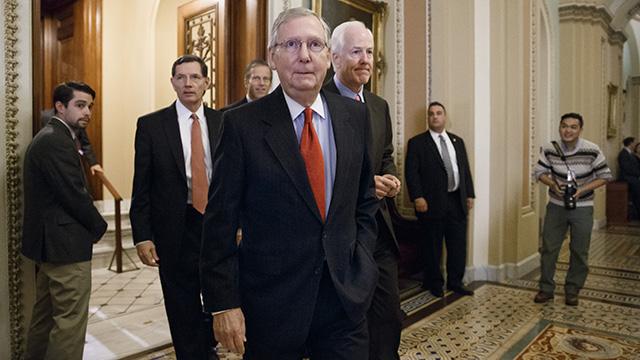This post first appeared at The Huffington Post.

Senate Minority Leader Mitch McConnell of Kentucky arrives to speak with reporters following a closed-door policy meeting on Capitol Hill in Washington, Tuesday, Dec. 2, 2014. (AP Photo/J. Scott Applewhite)
Update: Bloomberg BNA reports that “for now,” Sen. Mitch McConnell has backed away from the strategy Paul Blumenthal describes below. But campaign reformers remain “wary that the incoming Senate majority leader would renew efforts to roll back limits on campaign money when Republicans take over the Senate following the current, lame-duck session.” Stay tuned…
WASHINGTON — Sen. Mitch McConnell (R-Kentucky) is trying to use a massive appropriations bill to loosen campaign finance rules.
The Republican leader’s office is attempting to attach a policy rider to the omnibus bill that would effectively end limits imposed on coordinated spending by federal candidates and political party committees.
Currently, coordinated spending by candidates and political parties is limited based on a series of formulas for different offices. For example, the total amount presidential candidates may coordinate with political parties is calculated as the national voting-age population multiplied by two cents — a figure that is adjusted for the cost of living each election cycle.
The McConnell rider would allow parties to consult with candidate campaigns on advertising or other electoral advocacy without having the resulting spending count towards their coordinated limit, so long as the spending is not “controlled by, or made at the direction of” the candidate. The change would create a loophole essentially making the coordinated limits moot.
McConnell’s office did not immediately return a request for comment.
In practice, discarding the current limits would give candidates significant input into the spending of party committees that can accept much larger direct contributions than the candidates are allowed to receive for their own campaigns. Candidates are allowed to receive up to $5,200 per donor in a two-year election cycle, while national party committees can receive $64,800 and state party committees $20,000. Because politicians would be able to work more closely with the party committees that support them, the rider would effectively chip away at direct contribution limits for candidates.
“This is wildly inappropriate,” said Fred Wertheimer, the executive director of the campaign finance watchdog Democracy 21.
Groups in support of the limits, including Democracy 21, Campaign Legal Center, Common Cause and Public Citizen, sent a letter to Senate offices on Monday, opposing the inclusion of McConnell’s rider in the omnibus.
“Our groups strongly oppose an effort being made by Senate Republican Leader Mitch McConnell to sneak a revision in the campaign finance laws into an omnibus appropriations bill that would for all practical purposes eliminate the limitations on coordinated expenditures by political parties,” the letter said. “Senator McConnell … is now trying to rewrite the campaign finance law by burying a provision in omnibus appropriations legislation.”
The push to eliminate coordination limits between candidates and party committees comes as candidates are increasingly raising money for both national and state political party committees to aid in their elections. Through a joint fundraising committee, McConnell raised nearly $1.8 million for the Republican Party of Kentucky to help his re-election campaign in 2014, according to Federal Election Commission records.
Efforts to make it easier for candidates and party committees to coordinate are increasingly viable since the Supreme Court eliminated aggregate campaign contribution limits in its April 2014 ruling in McCutcheon v. FEC. Prior to this decision, donors were limited in how much they could give to candidates and party committees overall. But since the rules were eliminated, wealthy donors have increased their giving to party committees.
Wertheimer said he hopes that Senate Democrats do not allow McConnell to insert this provision into the omnibus bill during the December lame-duck session.
“It would be ridiculous for the Democrats to go along with this,” he said.


